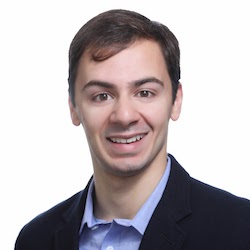Alumnus Spotlight: Joseph Casamento, Ph.D. ’22

September 6, 2022
Joseph Casamento, Ph.D. ’22, is a doctoral alumnus of the materials science and engineering program from Kenilworth, New Jersey. He attended the University of Michigan, Ann Arbor as an undergraduate and studied the functionality and application space of semiconducting materials at Cornell.
What is your area of research and why is it important?
My research interests involve expanding the functionality, and, accordingly, the application space, of semiconducting materials with nitrogen as the anion, aka nitride semiconductors. Nitride semiconductors find usage as light emitting diodes (LEDs) in solid state lighting, lasers, cell phones, and more. However, their ability to find usage in more applications is limited by a few specific material properties. The properties of a material are governed by its symmetry and constituent elements. For example, my Ph.D. dissertation work discovered enhanced dielectric permittivity and ferroelectric behavior when scandium (Sc) was added to aluminum nitride (AlN).
What are the larger implications of this research?
The larger implications of this research include the next generation of energy efficient electronic, photonic, and electro-acoustic devices that will contribute to new technologies. My research also aims to merge memory and logic functionality in integrated circuits by developing materials with properties that allow this. These technologies include higher speed internet, autonomous vehicles, smart devices, and neuromorphic applications, among others. This serves the current societal demand that desires materials that will allow for smaller devices which utilize less energy, output more power, and operate at higher temperatures and faster speeds.
What have you gained by participating in the NextGen Professors Program?
I have gained a great network of peers and colleagues across many disciplines who are incredibly talented and ambitious and are fantastic people. I have been able to converse about topics ranging from establishing scientific collaborations with other disciplines to strategies in academic job hunting and life changes after the Ph.D. program. I have also gained an understanding of the responsibilities and expectations of a future academic career. Most importantly, I have gained confidence in my ability to handle these aspects.
How has this program been helpful in working toward your professional goals?
This program has given me insight into the variety of responsibilities and skills that are needed to be a successful faculty member. In addition, the program has given me preparation for a variety of scenarios that occur in professional settings, with instances ranging from navigating conflicts; time management strategies; ways to promote diversity, equity, and inclusivity; and setting priorities and specific goals. In addition, there are several helpful resources that I have gained access to regarding these aspects. The ability to discuss these aspects with experts has been extremely valuable.
What are your hobbies or interests outside of your research or scholarship?
I enjoy hiking in the gorges, parks, and beautiful state parks nearby. In the summer, kayaking along the lake starting at Myers Park is a great experience. I enjoy ice skating in the winter even though my skills are limited. I also enjoy playing recreational sports such as basketball and volleyball. One of my favorite experiences is playing in the summer volleyball league at Stewart Park and watching the sunset. I would highly recommend a trip to Lake George and the Adirondacks region for those that have not visited there yet; it is such a beautiful area.
Why did you choose Cornell to pursue your degree?
Cornell has a tradition of excellence in physics and condensed matter research, especially in the area of electronic materials and thin film deposition. Cornell is highly regarded in these areas by experts in industry, national lab, and academic settings. My undergraduate research involved the synthesis of bulk semiconducting materials and there were several factors I could not control. To alleviate this, I wanted to grow thin films with the ultimate level of precision. I leaned toward pursuing molecular beam epitaxy (MBE) for my Ph.D. work, and Cornell is one of the best places in the world for it.
